
Sir Martin is Britain's Astronomer Royal. His TED lecture is the most important link on my entire website. And, here are the parameters that the Bulletin of the Atomic Scientists uses to predict the end of humanity. (The clock was at 3 minutes to midnight for the past few years, but at the end of 2016 it advanced by 30 seconds toward Doomsday. The Bulletin explains why here.) Yes, that had to do with former President Trump's seemingly casual attitude toward nuclear weapons and his blatant disregard of global environmental destruction including anthropogenic climate change.
Now in 2022, following the onset of Vladimir Putin's insanely reckless invasion of Ukraine, the clock has further advanced to 100 seconds before midnight
Global thermonuclear war (followed by nuclear winter) has always topped the list of extinction threats to humanity. The TED talks to be seen here by atmospheric scientist Brian Toon and by submarine commander Robert Green are stark reminders. (The scary chatter about imminent, overlord AIs is just an exotic distraction.) There are plenty of threats that trump terminator AIs: pandemics (natural or malicious,) chemical or biowarfare, and environmental destruction.
Harvard's Steven Pinker offered some hope in his recent book, Enlightenment Now, which showed there has been a long-term flourishing of the human condition. But, Pinker's dismissal of the threat of nuclear war or his minimization of other existential threats is unforgivable (and not in keeping with his usual erudition. Following Russia's invasion of Ukraine in 2022, Pinker's pollyannaish views of existential threats seem even more ludicrous.)

Day One of Russian President Vladimir Putin's ghastly invasion of Ukraine was on 24 February 2022. I've been transfixed by this war, and here I share some of the worldwide daily news coverage.
My mother's family had lived in Kyiv under the Czar and finally emigrated to California around 1900. Like many Jewish families we came to America to escape the pogroms and were thereby spared the megadeaths inflicted by Joseph Stalin and by Adolph Hitler.
I and the entire free world have been inspired by the fortitude and leadership of Ukraine's President Volodymyr Zelensky and by the courage of his countrymen.

25 December 2021: The James Webb Space Telescope (JWST) launched — a hugh relief for the thousands involved in this multidecade project.
8 Jan 2022: all major subsystems of the JWST have been successfully deployed: the 5-layer tennis court sized sunshield, the 7 meter tripod and secondary mirror and the side wings of the primary.
At the grandest scale the big questions that the telescope will address concern our cosmic origins.

For two millennia until the wars of the 19th and 20th centuries, China was one of the tech leaders of the world. Now, since China took a markedly capitalist direction under Deng Xiaoping, the world has seen the Chinese miracle. With its gleaming new cities, high speed trains, hydroelectric dams, and advanced manufacturing, China has achieved a GDP of 14 trillion dollars.
In large part China owes its remarkable progress to heavy state subsidies that have allowed it to acquire (by whatever means) tech designs from the West. But, can China go beyond merely copying designs to world-class innovation? I discuss factors that may accelerate innovation and tech dominance.
There are also factors that may stall or derail China's acceleration, eg bad investments and centralized control (discussed under China's Downfall: End of the Miracle) and also heavy-handed systems of thought and behavioral control (discussed under China's Surveillance State.)
On 4 Feb 2022 at the start of the Beijing Winter Olympics Xi Jinping declared his abiding friendship with Russia's Valdimir Putin, whose invasion of Ukraine immediately followed the closing ceremonies.
The fundamental tension in Beijing now as the world stands aghast at Putin's war is this: what's more important, continuing to expand trade with the world or face potentially crippling sanctions if we in the PRC support our Communist buddies in Russia. China would love to be able to quietly support Russia (and hope that nobody notices.)
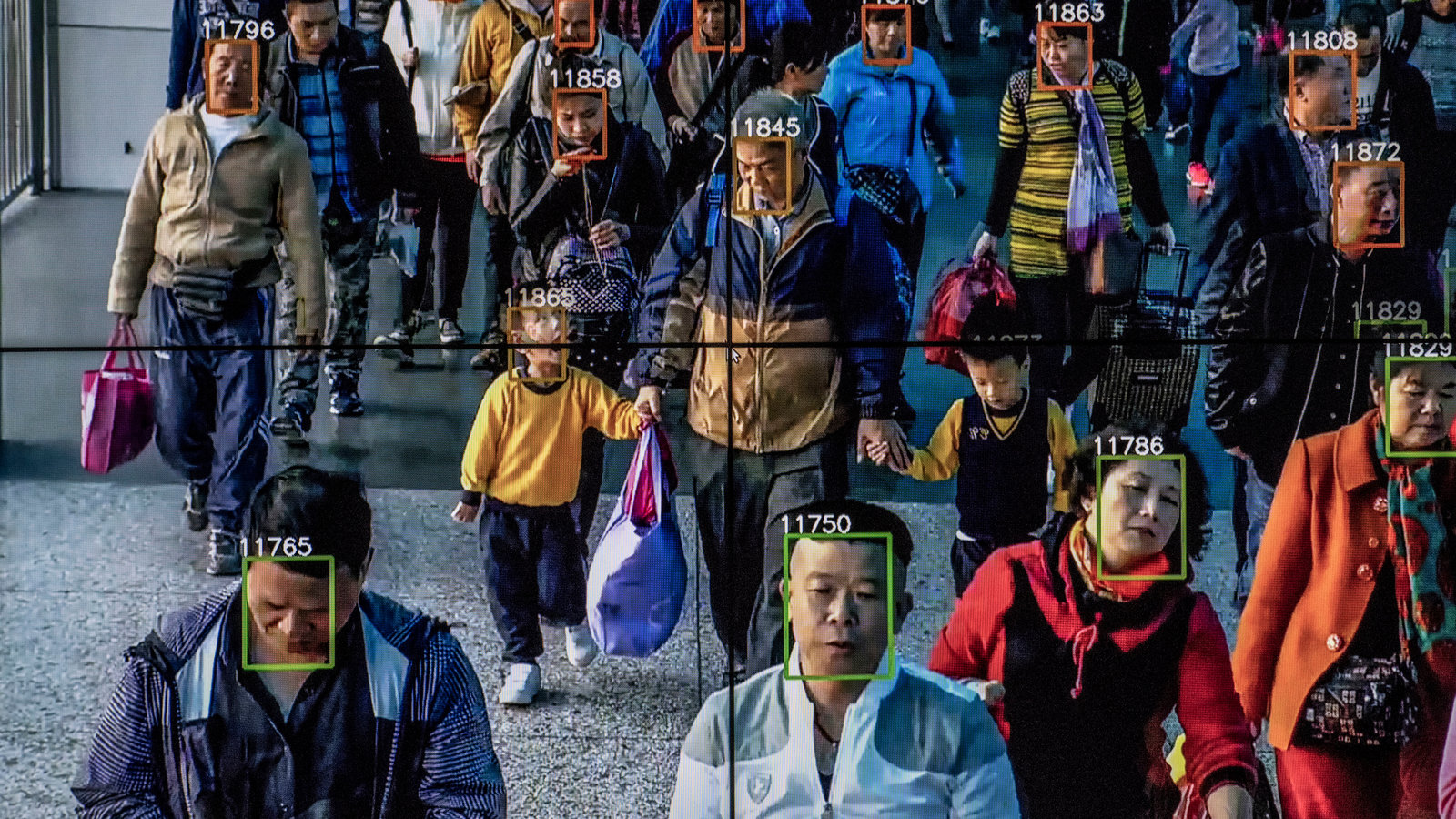
From the standpoint of the Party, China's new Social Credit System seems like the perfect way to maintain harmony in the Middle Kingdom. Every purchase, every phone call, every email is grist for the Big AI that computes your social credit score. Praise the Party and your score goes up; complain and your score goes down — every dictator's dream.
A crucial part of this new surveillance state is a network of 200 million (soon to be 600 million) video cameras. Those video feeds are continuously monitored by a massive AI system called — I'm not making this up — Skynet ! China spends twice as much on domestic surveillance as it does on its massive army. Billions of those funds flow into China's facial recognition companies like SenseTime and Megvii.

From its humble beginnings in 1978 Huawei has become the world's biggest seller of smartphones and networking equipment. That it copied designs from Apple and from Cisco follows a familiar pattern. However, Huawei has since become an innovation powerhouse with 13,474 5G patents. Meanwhile, the US is strangely absent as a 5G competitor.
Unfortunately for Huawei, it became the center of the Trump administration's war on Chinese tech in 2019 and 2020. Huawei's alliance with the PLA (the Army,) its alleged backdoors in its networking equipment, and its massive state subsidies have placed it at the center of the US's trade war culminating in an embargo of US chips (and some from TSMC and Samsung) and chip making equipment, a crippling blow.
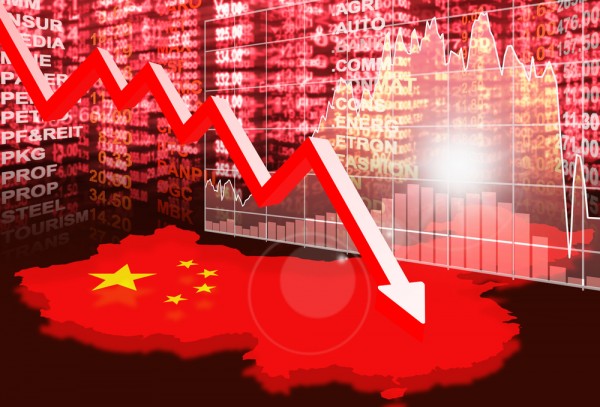
China's meteoric rise as a global economic superpower may (or may not) continue. Here, I draw a comparison to the Japanese miracle of the 1980s which abruptly ended in the 1990s and never resumed.
There are several potential risks and challenges to China's continued expansion — out-of-control debt, non-productive infrastructure spending (most notably Belt & Road,) competitor nations that can undercut manufacturing, necessary spending on poverty alleviation, alienation of trading partners due to human rights violations and Xi Jinping's aggressive militarization, and environmental destruction.
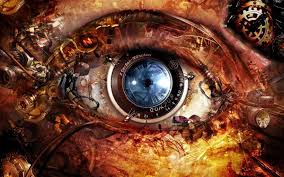
Attaining such supernal wisdom may entail understanding the entirety of the internet — not to mention hundreds of billions of real-time sensors. It will also entail advances in AI not yet even envisioned.
A byproduct may be the AI's ability to autonomously create Nobel-level science and engineering in many fields. This will not happen in my lifetime and possibly not even in yours.
Would this be desirable for planet Earth and our biosphere? Possibly, yes! Humanity's unchecked proliferation, uninformed by long-term sustainability, has been an unmitigated disaster for our biosphere.
Some SETI/Fermi Paradox cognoscenti believe there's a Great Filter that rids the Universe of technological civilizations, eg by nuclear annihilation or by crafty, rampaging AI. With regard to that, it seems to me more likely that superintelligent AI may eventually provide humanity with wise counsel and enhance our survival, rather than terminating us maliciously. They might ultimately be as good at steering civilization as they are at steering driverless cars.

Composed by the incomparable Jacques Brel, this is one of the most beautiful songs ever written. Poignantly bittersweet, it captures the triumph and tragedy of the human race.
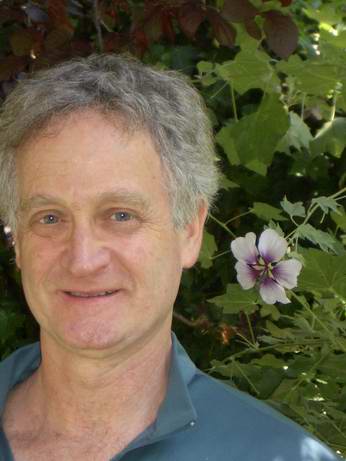
I wrote this about a decade ago when I first began this website. It still reflects my interests.

Every year I backpack in the Sierras, inevitably focusing on the big questions. How did all that exists come to be? Are there other Universes? Is mankind alone? Many physical constants that allow life to develop in the Universe appear to be finely-tuned. Did God sit at a control panel twisting the dozens of knobs that determine the interactions of the particles and forces that comprise reality? I discuss the views of physicists, cosmologists, and theologians.
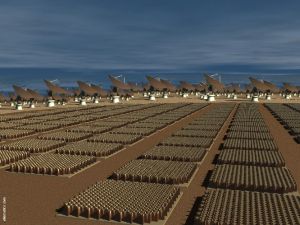
Is ET out there waiting to be discovered?
My guess is "yes!"— but the vast majority of extraterrestrial life is apt to be microbial. My viewpoint follows the SETI Institute and its founders and superstars. Included among those are Frank Drake — of Drake equation fame, Carl Sagan, Jill Tarter, Seth Shostak, and David Morrison.
Prof. Drake's car license plate reads N = L. The number of ET civilizations in the Milky Way is determined by their likelihood of survival. Our survival on Earth is not guaranteed but requires dedicated stewardship and devotion to long-term sustainability.
To paraphrase H. G. Wells, the future of humanity is a race between education and catastrophe.
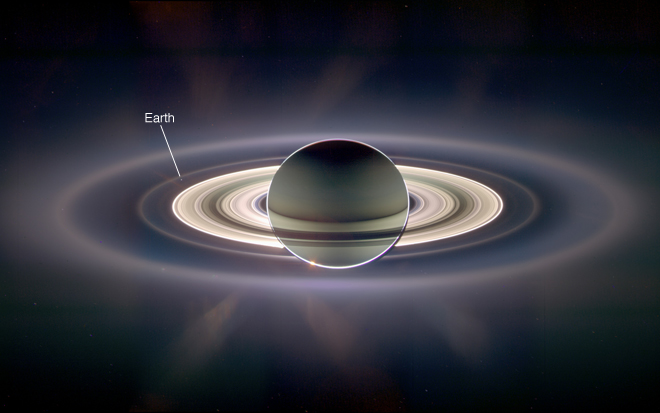
This is a real photo taken by NASA's Cassini spacecraft in 2006. Here the Sun is behind Saturn. With the Sun fully eclipsed, Earth appears as a pale blue dot. That blue color originates from the interaction of oxygen and water on Earth. ET would be able to tell from our spectrum that water and oxygen are here. Several proposed telescopes may be able to image Earth-like atmospheres on exo- planets.
Gemini Planet Imager started collecting exoplanet spectra in 2014. The Thirty Meter Telescope being built on Mauna Kea will greatly expand the search.
Imaging exoplanets depends on Adaptive Optics (AO)—
see video from Boston Micromachines .
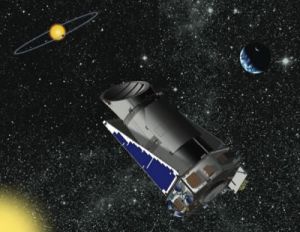
The Kepler Space Telescope would regularly generate headline news.
Based on its discoveries, it's now certain that planets orbiting other stars (exo-planets) are common.
Before its demise it was looking fixedly for planetary transits as it orbited the sun millions of miles from Earth.
2018 Addendum: TESS (the Transiting Exoplanet Survey Satellite) successfully launched and was the exciting new successor to Kepler. Over the next few years TESS discovered many more new exoplanets, including Earth-sized rocky planets.
Following launch TESS fired its thrusters and achieved its final science orbit in June, 2018. It ended up with an orbit resonant with the moon's and orbiting the Earth every 13.7 days (with an apogee 233,000 miles (376,000 km) from Earth.)
September 17, 2018 update: NASA shared these stunning first science images from TESS.
Now in early 2022 the world is anxiously awaiting the initial images from Hubble's and Tess's successor: the James Webb Space Telescope (JWST).
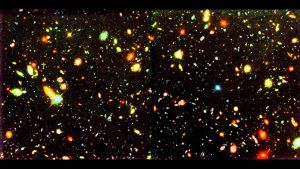
Here's the ultimate big picture.
Our planetary civilization is a microscopic, transitory blip at this scale. And yet, the future of civilization may hinge on our collective efforts.
Here's another magnificent video by astronomer Tony Darnell. — on the JWST ( James Webb Space Telescope), Hubble's replacement (but in IR,) which will launch in 2021. (I've had a front-row seat, as one of my close friends was designing and testing the imaging instrument. Here's the inside scoop: the JWST being tested at Goddard.)
Above, a remarkable animation from Nature showing the newly calculated position of the Milky Way (our home galaxy) with respect to surrounding galactic superclusters,including the Virgo Supercluster and the Great Attractor.
The newly discovered massive supercluster, Laniakea (Hawaiian for immeasurable heaven), includes both of them.
So, on these grand scales is human civilization hopelessly insignificant or incredibly significant? The answer is ... both!

Planet Earth has too many human beings. And even worse, developed countries — the United States, in particular — consume far too much. We have too many houses, too many cars, and too much stuff.
The United States has 334 million and the world has 7.9 billion.
For years I wondered why the Bill and Melinda Gates Foundation (forty four billion dollars) wasn't tackling birth control. Couldn't they see that that's one of the main problems creating poverty? Well, they woke up. In this must-see TED Talk, Melinda Gates presents the case for birth control.
Yes, our population growth in the USA has slowed but we're still consuming 25% of the world's resources. That over-consumption is poisoning the planet and devasting other species.
In 2015 PBS aired a show on sustainable businesses featuring Ray Anderson (carpet manufacturer and eco-superhero (?!)). See Ray's TED Talk..
Worldwatch Institute's founder, Lester Brown, is excellent. See his video at Google HQ . Also see the wiki on sustainability.
Look at this list of the growth rates of the world's 233 countries. Lack of birth control dooms a country's future.
But, this video on longevity/ wealth in 200 countries (from Hans Rosling) is (perhaps overly) optimistic. He argues that reducing infant mortality is the key to reducing explosive population growth in the undeveloped world. (Although persuasive, he confuses association and causation.)
That confusion is pervasive in the medical literature. I wrestled with it for a decade in my Stanford medical database research. .
My view is that reduced infant mortality is simply a marker of success. The real cause of success is women's access to birth control. Let's stop the political correctness — the major problem on Earth is too many people!
But, for a ray of hope, see Paul Hawken at Bioneers.
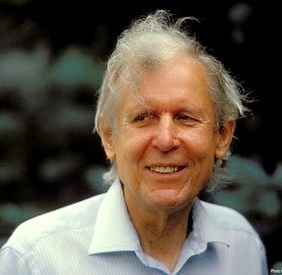
I heard priest and historian Thomas Berry speak many years ago.
His book, the Universe Story, combined scientific cosmogenesis with a story that emphasized the obvious creativity latent in the Universe.
His later books, particularly The Great Work focused on the wanton environmental destruction that has resulted from mankind's insane view of its perogatives.
Thomas Berry — particulary as a man of the cloth — was a great voice for the environmental movement. It's up to us to continue his Great Work.
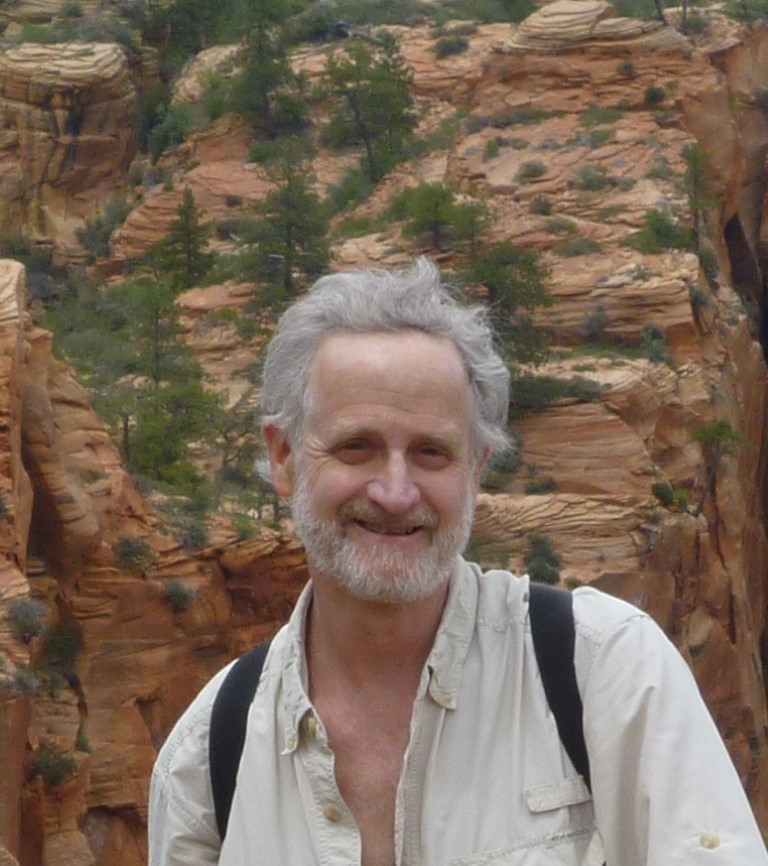
It was summer of 1968 and as a college kid with a low draft number I was highly susceptible to being sent to Vietnam. But, there was no way in hell I was going to be sent there to napalm innocent Vietnamese peasants. (Some friends had been drafted; some had left the US; and some had filed for conscientious objector (CO) status.)
My application for CO status required a statement that is linked above. That statement is a forthright exposition of my anti-war sentiments at age 21 — as inspired by my Jewish background and my scientific worldview. The essay also captures the volatility of the era and prefigures my career trajectory as a physician and researcher.
The cover letter to my CO application is here. It is a no-holds-barred challenge: grant me CO status and let me do alternative community service or I'm outta here.
A few months later my applications to medical school proved successful, and I was off to UCSF Med School in 1969 where I was in an MD/PhD program. Medical school conferred an automatic deferment, and by the time I graduated in 1973 the war was over.
The Ken Burns PBS documentary, The Vietnam War, is a must-watch for all Americans. It conveys the immense tragedy that the country, my friends, and I were enmeshed in. My sympathies continue to be with all my friends, whatever their paths, who lived through this turbulent time. Now in 2022 I am transfixed by the War in Ukraine, evoking as it does many of those memories.
Above is the trailer for a wonderful PBS documentary on John Muir, one of my life-long heroes and sources of inspiration. Every summer I tread the same ground he did in the Sierras and feel the same universality of nature. John Muir, through his depth of conviction and clear scientific mind, persuaded Congress to create the National Park System, beginning with Yosemite.
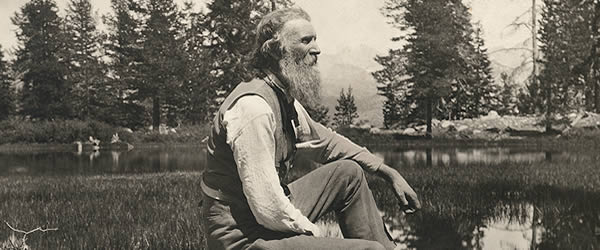
Nature and Culture International (NCI) is my favorite eco-NGO.
Founded fifteen years ago by entrepreneur and ecologist, Ivan Gayler, NCI has protected millions of acres of precious rain forests in Ecuador and Peru. Those regions have some of the highest concentrations of unique and endangered species anywhere on the planet.
The culture piece of NCI's work is crucial. It refers to its emphasis on employing natives and local ecologists to carry out the preservation effort.
As a result, NCI's budget is super efficient — almost no money spent in the USA for staff — almost all the money is used directly for land protection and preservation by locals.
Fans of Jane Goodall or of E. O. Wilson please note: they're both on NCI's board. (This is the most important ecology organization you've never heard of. Zero money for publicity.)
These videos describe Ivan's vision and NCI's work: Save the Rainforest and NCI Saving Rain Forests.
And, here is a new PBS Visionaries documentary, hosted by Sam Waterston, on NCI's crucial work.
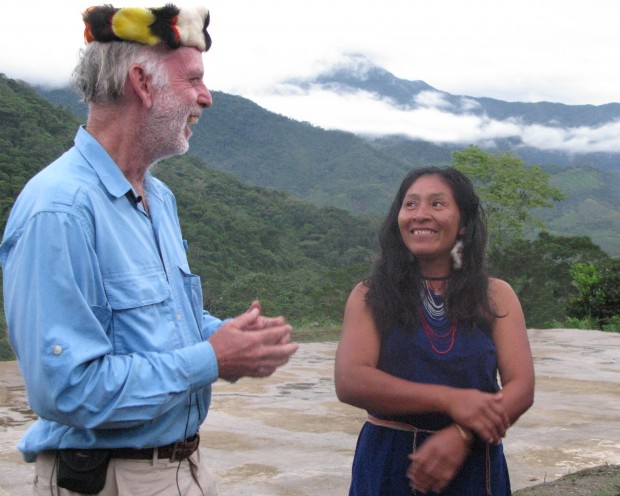
My favorite website for environmental reporting is Mongabay.com .
Mongabay's international network of reporters scans the globe for detailed and accurate information on the environment. Annually, it garners grants and awards from some of our largest foundations.
Due to falling revenues, newspapers (like the New York Times) have had to lay off their environmental correspondents. Mongabay — getting millions of hits a month — has helped provide news coverage on this essential topic.
Here, National Geographic provides fast facts about global warming.
The evidence is abundant (and universally accepted by experts) — global warming is real and caused by mankind.
In this must-watch 2019 video from Extinction Rebellion, actor Harrison Ford implores us to stop the rampant destruction of Earth's forests. The burning of rain-forest lands for industrial production is creating an unparalleled, eco-castrophe.
The IPCC, Intergovernmental Panel on Climate Change is the definitive source of reliable information and states the consensus of climatologists .
Al Gore was on top of this story a decade ago. Now, global warming is on a steamroller.
Donald Trump readily poses for photo-ops in the wake of hurricanes. But his pulling the US out of the Paris Climate Accord was a major error and embarrassment. China has overtaken the US in sales of photovoltaics and other alternative energy sources.
The Keeling Curve records the monthly atmospheric CO2 on planet Earth. It hit 414 parts per million last year and continues its inexorable climb. The cause is simple. “We keep burning fossil fuels. Carbon dioxide keeps building up in the air,” said Ralph Keeling.
A new study predicts that by 2080 global warming will cause a drastic reduction (50%) in species habitats.
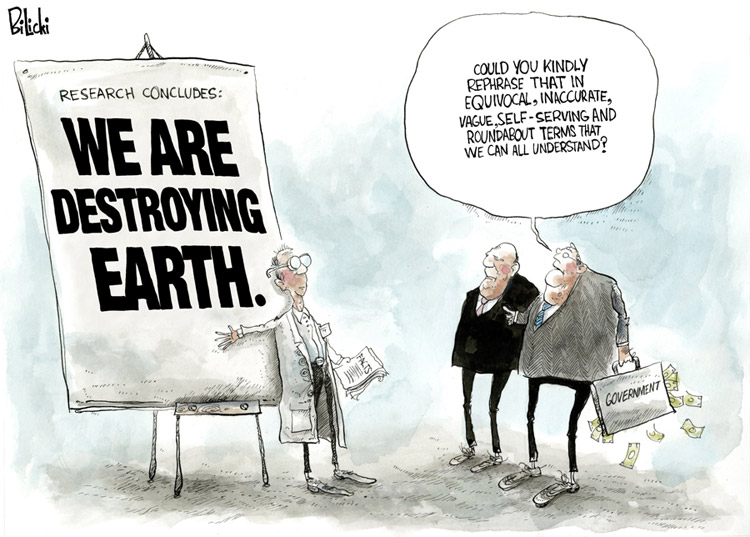
Brilliant cartoonist Justin Bilicki hits the nail on the head, as usual
A fitting tribute to a president whose strong-arm tactics brought the United States to new lows in the eyes of the world, on a par with third-world nations ruled by tin-pot dictators. (This reached a new low when Attorney General Bill Barr, Trump's AG lapdog, departed at the end of 2020 in a fit of mutual nausea over a failure to condemn the Democrats' "stealing the election."
In an extraordinary meeting, top environmentalists and top evangelical leaders met at Harvard to jointly promote the rescue of Planet Earth. Read their inspiring statement. Religious people need to understand the scientific data. And, scientists occasionally need to take a moral stand (perhaps with the fervor and zeal of the church.) Preservation of Earth's biosphere is exactly one of those issues.
Combining intelligence, inner calm, and raw guts, Sam Harris is my go-to guy for navigation of the moral landscape. (I just began to support his superb podcasts and public events.) Sam is best known for his views on religion - he's not an enthusiast. But he also fearlessly attacks dogmatic, unexamined views in other arenas, especially politics. The loudness of his critics — from the left and the right — attests to his uncompromising rationality.
Sam Harris votes as a Democrat, but you can see in this video on Radical Islam why he upsets and confuses many liberals. (In case you're new to this, Sam Harris is really trying to help Muslim intellectuals (like his colleague Maajid Nawaz) build a culture of tolerance. Maajid Nawaz, as a former Islamist turned counter-extremist, is another courageous force for modernity.
And, Nobel Prize winner Malala Yousafzai is another shining example of immense courage. In this inspiring interview Malala shows the path forward. The liberation of women in the Muslim world will help the economies of the Middle East compete in the twenty first century.
Frequently, Sam Harris also warns about the eventual arrival of superintelligent AI. Here, in April, 2018, he discusses this (audio only) with Silicon Valley VC superstar Steve Jurvetson.
Watch Facebook's CEO Mark Zuckerberg on the hot seat in April 2018 as he skillfully parries forty three US senators. Obviously, Cambridge Analytica's manipulation of our election in 2016 with data scraped from Facebook was and is a problem. Nonetheless, I have confidence that our doctrinaire Congress can undermine America's domination of technology and the internet by hasty, heavy-handed regulation — exactly what Elon Musk and Sam Harris can look forward to, if their calls to regulate AI are heeded.
Ever since Charlie Rose crashed and burned in 2017, I've had to fill the midnight hour with some other means of getting long-form journalism. Sam Harris's superb podcast (above) is one solution. The other solution is the podcast of Preet Bharara, the former U.S. Attorney for the southern district of New York. (I power walk two miles every midnight listening to either Harris or Bharara. Last night (April, 2018) I listened to Preet's superb interview of Stanford's Professor Michael McFaul, former ambassador to Russia. Charitably, McFaul underplays the notion that Putin "has the goods" on Trump. Hopefully, the Mueller investigation will help expose why Trumpsky pussyfoots around Russia's gigarich omnipotent dictator.)
If you've never listened to Stay Tuned With Preet, it is disconcerting to hear Preet advertise mattresses and internet recruiters — it's like Einstein or Gandhi or Lincoln pitching toothpaste. But just deal with it! Unlike Sam Harris or PBS, Preet has evidently decided to be supported by ads rather than by his thousands of fans. He's a superstar legal insider (who might've been Attorney General under Hillary) —I cut him slack on the bizarre ads.
BTW, Harris or Bharara or Yale's Professor Jake Sullivan would be ideal Presidential candidates for the Dems in 2020 — but only in an alternative universe run by intellectuals, maybe looking more like Singapore under philosopher king Lee Kuan Yew.

Another winner by Theo Moudakis of TorontoStar
If you're as plugged into YouTube as I am, you're aware of the deservedly ubiquitous public intellectual Prof. Yuval Harari. Above he argues against the horrors of factory farming - he's a vegan - and the crucial role that scientists need to play in taking moral stands.
Most of Prof. Harari's mega-watched TED talks and interviews deal with the future of humanity. (But, for the crowd I run with, this stuff is old hat: humanity transcending the limits of biology, AIs transforming civilization, and extinction threats.)
After twice reading Ashlee Vance's superb bio of Elon Musk, I wondered what would be next on my bedside table. From the deep past came a recommendation for Barbara Tuchman.
Harvard-educated and with ambassadorial blood, Ms. Tuchman won Pultzers for two of her works and all were best-sellers. I'm working my way through all of them. (Like my long-time favorite author, Steve Pinker, her secret is the same — it's ninety percent talent added to ninety percent work.
I started with The Guns of August (1962,) which garnered her first Pulitzer. In fascinating depth, it tells the story of the first month of World War One — August, 1914. Wholesale slaughter was only introduced to Americans during our Civil War. This is an exclusively European tale (from all sides) as told by the politicians and generals who formulated the strategies that shaped the war (and ultimately the twentieth century.)
Delivered March 30, 2015 at the dedication of the memorial to Senator Edward Kennedy, this speech (enthusiastically applauded by many Republican congressmen), addresses the wonderful spirit of bipartisanship that Kennedy championed, even in his spirited debates with leading conservative voices like Utah Senator Orrin Hatch.
Starting in 2004, a series of books appeared on the bad aspects of religion: mindless belief in miracles, faith, and dogma and the crimes committed in their name. The courageous authors of those books have several online videos. Here are some favorites.
Sam Harris, author of The End of Faith and Letter to a Christian Nation
Richard Dawkins, author of The God Delusion
Daniel Dennett, author of Breaking the Spell
Christopher Hitchens, author of God is Not Great
My view is that religion can have many positive aspects, well exemplied by my many religious friends who do charitable work.
I personally favor secular humanism — traditional virtues and positive psychology without the miracles and the dogma. (Ok, perhaps it would be even better if we had some inspiring gospel singers.)
Optimism, hope, love, kindness, charity, and compassion are wonderful — the propagation of fairy stories and falsehood is not.
(There is one grand supernal miracle — the unfolding of the Universe.)
The notion that our Universe is just one of the 10500 predicted by string-theory is a cop-out.
The animator here captures the spirit of Earth's biosphere, a living wonder, that all of us must work to preserve.
A beautiful (and family friendly) animation stepping successively down to the smallest objects and up to the largest objects in the Universe. Click each object for pop-up info.
Poet Laureate Maya Angelou's lovely poem, written in celebration of the 50th anniversary of the United Nations.
The angelic voice of Enya combined with a sublime tour of the heavens —
and the beauty of untrammeled Earth.
And, here in
Enya's Caribbean Blue.

Another sumptuous collection of fantastic images of Earth, the Universe, and the Surreal. We are part of something far bigger than we can imagine. Science strives to explain Reality: Spirit, at its most transcendent, restores its Unity.
An incredible melding of physics and music from artist engineer Nigel Stanford. Resonance lies at the beating heart of aesthetics and spirit.
I've always been a fan of Maslow's Hierarchy of Needs.
Here are some of his top-level concepts: — self-awareness, growth, honesty, self-actualization, wisdom, transcendence.
And, here is Nobuyuki Tsujii at Carnegie Hall playing his Elegy for the Victims of the Tsunami of March 11, 2011 in Japan.
This video by Peter Russell has long been a favorite. In half an hour he presents the history of life and mankind.
Humanity has such destructive potential that we may perish unless we can make sacrifices for a sustainable future.
Here, Joseph Campbell's work on the Hero's Journey is concisely illustrated with clips from The Matrix.
Crows are amazingly intelligent tool users.
When I backpack, I observe the Clark's Nutcrackers, another of the Corvidae. They can remember thousands of seed caches.
(I know my readers have all seen the wonderful 2009 movie Avatar — and here in 2025 we've also enjoyed Avatar 2. I wrote this review when Avatar first appeared. You may still enjoy the links.)
With breath-taking 3D graphics and a better-than-expected script Avatar (like the original, 1977 Star Wars ) is a film I've seen many times.
While the script borrows heavily from the past (At Play in the Fields of the Lord, Dune, Fern Gully, Dancing With Wolves), it's a great reworking of important themes.
The main dramatic conflict is a high tech army of mercenaries in the employ of a multinational corporation exploiting the natural resources of a native people who live in a pristine jungle. Sound familiar? Think Big Oil drilling for petroleum in the Amazon or Brazilian agribusiness burning forests to graze cattle. Readers of this website know my sentiments. Even my conservative friends shrink from this kind of unconscionable 19th century exploitation. World Ending in 2012? (Vote for Sarah!)
A less readily defensible position taken by Avatar is the notion of the peacefulness and bliss of native pre-technological peoples - the assumption of the Noble Savage — that people uncorrupted by technology are less prone to violence than are modern folk.
(Of course, in fiction, to heighten drama, anything goes — but some may confuse art with life.)
Some may think that technologic society is becoming more violent. That would be wrong. Watch Harvard Professor Steve Pinker's TED Talk on the myth of violence of to be set straight.
In 1651 in Leviathan Thomas Hobbs concludes that "(in primitive societies) the life of man is solitary, poor, nasty, brutish, and short."
And, what of the avatars — meat puppets animated remotely by the spirits of others?
Avatars have been a staple of sci fi since Wm. Gibson's Neuromancer and Neil Stephenson's Snow Crash .
An explosion of online verisimilitude is just around the corner (especially in 2016) and somewhat later in robotic avatars .
Telepresence is now widely commercialized as in this video of Intuitive Surgical's da Vinci robot). This is also one of the near-in paths to immortality as in Gordon Bell's Total Recall.
In the near future our online avatars may represent us politically. Facebook (now META)2035 may be your online rep working for you 24 by 7 by 365 - coming soon to an internet near you.)
Most uplifting in Avatar is the transcendent spirit and natural wisdom of the Na'vi (the natives) as they live in harmony with the Pandoran forest world.
Gut-level communion with Nature is gone in modern man. However, that spirit burned brightly in the writings of John Muir, of Carl Sagan, and of Thomas Berry. The measure of our technology is whether it heightens or suppresses that spirit.
In 2010, Avatar dollars helped rescue California from avarice. James Cameron's one million dollar donation helped squash California Prop. 23, a greedy, short-sighted attempt by Big Oil to kill clean energy.)
The Martian is a wonderful (2015) hard sci-fi novel in the Clarke/ Heinlein/ Asimov tradition. With believable sci-tech from Mars-Direct by Bob Zubrin, it features bravura engineering and a thrilling plot. In 2015 it was released as a movie starring Matt Damon and directed by Ridley Scott. (As my readers know, I'm not a fan of humans on Mars (travel time is too long; robots are more cost-effective. My long-held sentiment is that humans may settle on Mars only after the robots have built the Mars Hilton. Also note: if humanity survives the current century, we will NOT be the final-word in intelligence.)
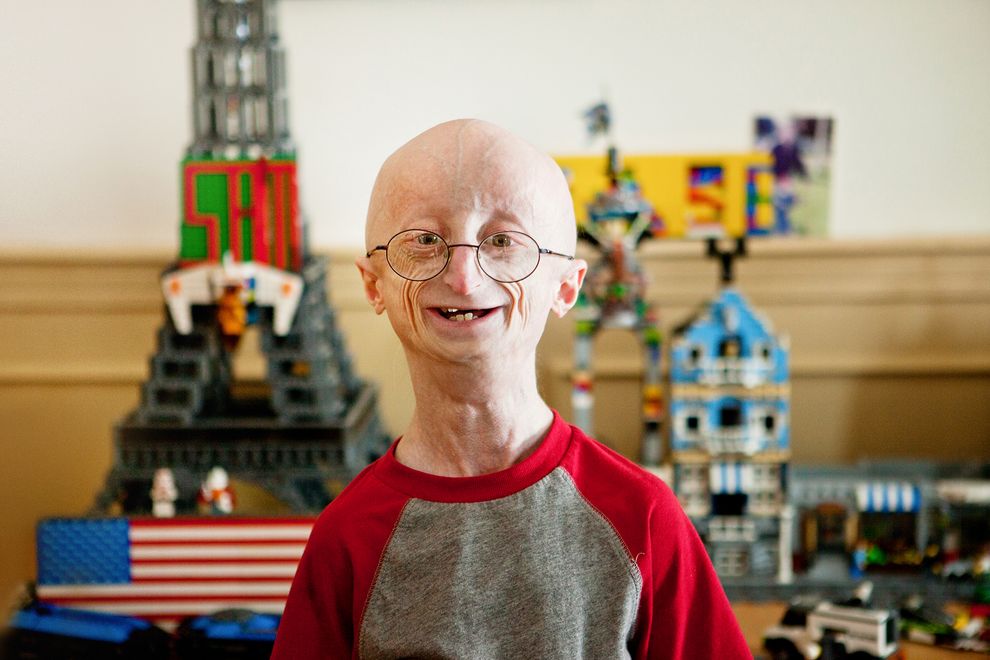
This is a stunning TED talk.
Sam is a high school student with progeria (vastly accelerated aging.)
His lifespan will be short, but he makes the most of every day.
And, here's another beautifully inspiring TED talk by Isaac Lidsky,
who asks, "What reality are you creating for yourself?"